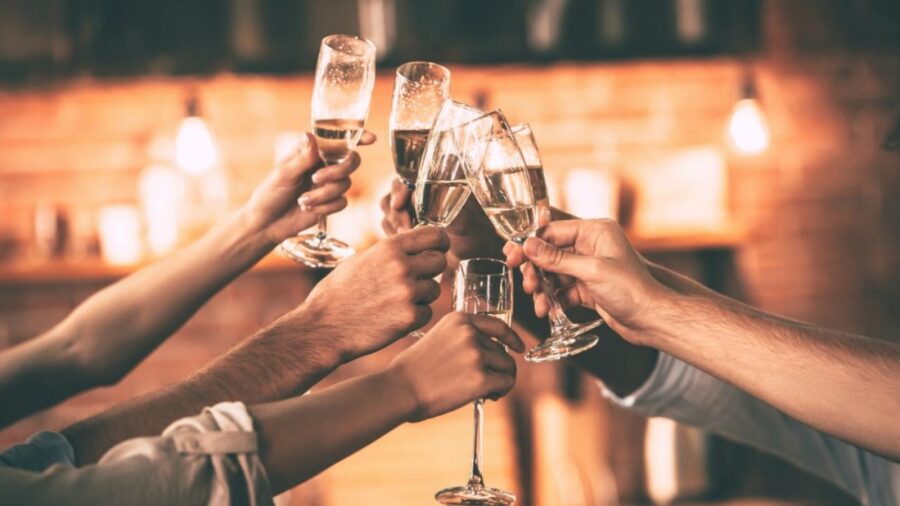I write this just a week after I attended a very special retirement gathering for a longtime friend and colleague, Kristopher Wilson, an award-winning professor of broadcast journalism at the University of Texas at Austin. He retired after his eventful 30-year career took him through several media markets as a meteorologist and five university campuses where he taught thousands of broadcast journalism and communications students. Dr. Kris, or Special K as I have always called him, was beaming with pride during his virtual retirement gathering. Zoom windows were filled with friends from throughout the world enjoying a slide show and video of his life, sharing stories of their adventures with Kris, and joking over a clip of him on air reporting the weather in Denver during his early years. As we Dr. Kris fans lifted our glasses, showed off our cats as they paraded across our keyboards, and compared the day’s weather from our different locales (because that’s what you do with a weather scholar), I found myself considering the importance of ritual.
Rituals matter today more than ever, especially as the year 2020 plods ever so strangely to its completion. I’m imagining upcoming socially distanced New Year’s Eve “Good Riddance Masked Balls” to say good-bye to all that went wrong this year and to express hope for a better 2021, one where we reflect on all we learned and take affirming action on what makes us all “essential.”
Why is Ritual Important Now?
According to the London-based School of Life, rituals were ever-present in traditional societies. Often tied to religious tradition and mystical powers, rituals provided periodic invitations for people to come together and mark an occasion. They would wear special clothes, eat specific foods, say profound things, and occasionally purge themselves of sin. Sometimes they would dance. But ritual wasn’t just about faith. The ancient Roman festival of Saturnalia was an exuberant annual carnival, emboldening citizens to free themselves from societal norms in order to partake in gambling, exchange gag gifts, play different social roles, and even swap lovers. It was described by the poet of the time “the best of days.”
But why?
Saturnalia, and every ritual before and after, was designed to bring about an outcome. Rituals are structured so that we are somehow helped, urged to grow, transitioned to a new stage, reconnected to an important idea, or guided to inner peace. Rituals are also communal. They are +1 experiences, or more commonly +many experiences. As the cliché of 2020 reminds us, “We are in it together.” Our rituals underscore that.
As we moved into modern times our rituals have succumbed to the isolation of private experiences. In the nineteenth century, labor activists during the Industrial Revolution stood up against the rising revenue motive among corporate bosses who believed that rituals were in no way profitable and that the “collective purification of the soul” should be limited to workers’ personal lives. And today, centuries later, our workplaces are again grappling with how to manage ritual. It’s different though in 2020, isn’t it? For so many, our existing and persisting work-from-home requirement has made it difficult to gather cohorts, teams, or workgroups in any meaningful way. Take the staff and faculty who lead our college campuses in this new era. Gone are the live rituals of new faculty and staff orientations, catered committee luncheons, department retreats to kick-off the new academic year, convocations to welcome new and returning students, or tailgating parties to ignite the spirit of zealous athletic fans.
Is it possible that we are losing what one critic described as our “appointment with collective emotions” or as wedding celebrant Tiu De Haan shared in her TEDx talk, “a container around a moment?” I hope not. In both our personal and in our professional pursuits, it seems especially important that we honor our rituals, modifying them to meet today’s conditions and inventing new ones to diminish the palpable sense of isolation so many of us experience when we are not physically together.
Four Reasons Why Rituals Matter
As our workplaces have become more WFH, and may in some industries stay that way for the indefinite future, the collective rituals we hold reinforce our organizational culture and enhance our engagement, satisfaction, and compassion for our colleagues and stakeholders.
- Ritual ensures differentiation—time is messing with our heads this year (e.g. I think today might be Blursday). Days, weeks, and months are morphing into a blob of sameness. We assert that in fact, our lives are more than “same old same old” by creating experiences that are different from routine. The experiences we create to mark time—like the start of a semester, the welcome of a new staff member, or the culmination of a project—place necessary dot points on our timelines. They remind us that though our current sense of time may feel like a slow read, important milestones break our narrative into the chapters we share and pages we turn together.
- Ritual creates meaning—for most on our teams, the thrill of WFH ended in early July, if not before. We can claim victory! We have proven that we can get the job done remotely, and now we call for rituals that lift our spirits, deepen our thinking, and remind us that we have roles to play—roles that matter to our organization’s bottom line and that matter to one another.
- Ritual connects the individual to the collective—whether we are closeted introverts who may be thriving in an isolated work environment or extraverts clamoring to lead our next virtual webinar, our rituals remind us how our contributions meet the needs of the entire organization. We crave experiences that cut through the confusion and clue us in to the current operating plan, even if the plan constantly changes. Especially in today’s absence of clarity, we yearn for rituals that bond us to something bigger than ourselves.
- Ritual locks in memories—whenever we can claim a post-pandemic workplace, we want to look back on this time with fondness for the rituals we honored that kept us active, inspired, and connected to one another.
Micro-Rituals Make an Impact
As we lead through these uncertain times, we might dismiss the notion of rituals as time wasters with limited return or impact. But rituals don’t necessarily need to be complex or time consuming. For instance, years ago when a center I led was transitioning from an antiquated email system called Eudora to the newer, state-of-the-art Microsoft Outlook, my office manager approached me with the suggestion that we gather our entire staff in the breakroom and hold a “funeral” for the outgoing e-system. I remember a cardboard tombstone on the table with “RIP Eudora” etched on it surrounded by a bounty of food items we all brought in to share. Speeches were made by members of the staff who humorously reflected on the old days when Eudora was in our lives. As we enjoyed our communal lunch, materials were distributed to help us prepare for Outlook’s go-live date. What I just described took place in 2003, and I still remember this simple ritual to mark the end of one program and the birth of another.
There are many other examples of more current micro rituals I’ve been collecting from my network and clients.
An innovative staff meeting ice-breaker becomes a ritual of sharing. One of my colleagues begins his regular virtual staff meetings with a prompt to his team, such as “If only I. . .” Each staff member is asked to respond to the prompt in the Zoom chat box but not push send until the leader gives the go-ahead. When he does, everyone’s screens fill with the aspirations of each member for brief discussion before digging into the day’s agenda.
An all-staff welcome e-mail encourages self-care rituals. Clients of mine who lead a large university division sent an all-staff communication last week with the subject line, “Labor Day Weekend Message.” The beautifully constructed memo expressed gratitude for all who rose to the occasion over the last six months. It laid out multiple self-care rituals encouraging each and every staff member to set boundaries, make time for physical and mental health, and recharge regularly with friends and loved ones.
A renewed focus on diversity, inclusion, equity, and social justice prompts new learning rituals. One executive director has created regular gatherings with featured speakers and experts to reaffirm his team’s focus on racial equality and anti-racism.
Gathering interested colleagues to dish over the latest beach read or sip their favorite beverage creates rituals of shared interest. Several I know have created book clubs, regular Zoom happy hours, and even Zoom music videos to bring people together off the clock.
Recognizing job anniversaries promotes a ritual of recognition. One leader has created special virtual celebratory events to commemorate the hire dates of staff members.
A music playlist inspires a ritual of eclectic preference. One administrator kicks off and wraps up virtual staff meetings each week by playing music on Pandora or Spotify representing the favorite music of each member of her staff.
Structuring regular connection within a staff shapes a check-in ritual to overcome isolation. Another has created staff pairs who commit to checking in on one another via e-mail, phone, or text between all-staff gathering to ensure that all is well.
All of these efforts, and there are so many more, represent small ways we can create rituals with limited resource.
Guardians of States of Mind
One writer says that rituals are “guardians of states of mind.” It goes without saying that at this moment it is far too easy for us to give into those more negative states; there is an abundance of those to be found. The year 2020 has not doled out much profit to any of us, except for maybe Netflix. Yet, Dr. Kris Wilson’s Zoom retirement celebration last week was a special “container around a moment.” It mattered to those who organized it, created meaningful differentiation for a student-centered leader, and locked in a fond memory among the friends who lifted their glasses in celebration of a career well spent and a third act waiting to be discovered.
P.S. Ritual is not always celebratory. This article is posted days after the 19th anniversary of the four coordinated terrorist attacks against the United States on September 11, 2001. Messages are passing through our media feeds to remind us. One in particular closes with this ritual worth adopting: “As you live and enjoy the breaths you take today and tonight before you go to sleep in preparation for your life tomorrow, kiss the ones you love, snuggle a little tighter, and never take one second of your life for granted. Never forget.” Maybe collective pause is the most profound ritual of all.





